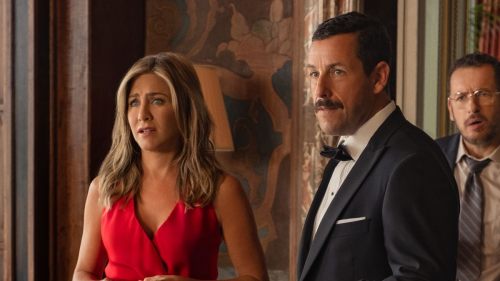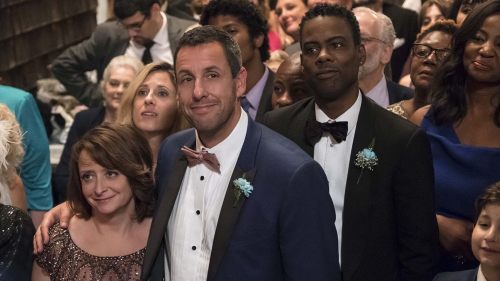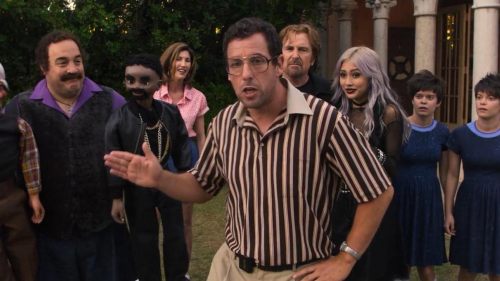Meet The Woman Who Turned Adam Sandler, Chris Rock And Dave Chappelle Into Movie Stars
Today, Tamra Davis is celebrating the anniversary of her now twenty-year-old baby, Billy Madison. Last year, however, Tamra Davis didn’t know if she’d ever get to make movie audiences laugh again. Taking a thirteen-year break from making movies will do that to you.
Back in the 1990s, Davis, now 53, was a steadily working and in-demand Hollywood filmmaker, the director whom producers would call upon to break in actors ready for their first big projects as headliners. After directing dozens of music videos, including Tone Lōc’s “Wild Thing,” Sonic Youth’s “Dirty Boots” and Young MC’s “Bust a Move,” Davis switched over to movies with her 1992 debut, the critically acclaimed Drew Barrymore drama Guncrazy. She was destined to make people laugh, however, and to do so with dirty bro humor. In 1993, Davis guided Saturday Night Live breakout and burgeoning movie star Chris Rock through the gangsta rap mockumentary CB4, Rock’s first film as a leading man; two years later, she did the same thing for Rock’s SNL cast-mate and friend Adam Sandler, directing the on-the-rise comedian’s hit Billy Madison, and in 1998, Davis completed her comedy breakthrough hat trick with Half Baked, starring and co-written by then-upstart Dave Chappelle.
Four years after Half Baked opened, Davis’ reputation for ushering in big-screen novices led her towards Crossroads, the movie that was supposed to turn pop sensation Britney Spears into a movie star. It didn’t, of course, receiving largely negative reviews yet doing little to Spears’ music career. Davis, however, hasn’t directed another feature film since. Not that the disappointment surrounding Crossroads sank her - rather, Davis and her husband, Beastie Boys member Michael “Mike D” Diamond, decided to expand their family. “Mike and I were together for such a long time, and he would tour and I would make movies, and I was in my mid 30s,” says Davis. “It was getting to the point where, if I don’t have a baby now, I may not ever be able to have a baby. So that’s what I did, even though my career was going really well.”
Since Crossroads, Davis, who now has two sons with her older Beastie Boy, hasn’t stopped working entirely. She’s been a fixture in the television world, directing episodes of My Name is Earl, Ugly Betty and Grey’s Anatomy, as well as both directing and executive-producing VH1’s hugely popular original series Single Ladies and Hit the Floor. There was also the online cooking show she made in her actual kitchen, Tamra Davis Cooking Show, along with a cookbook, Make Me Something Good to Eat. “The cooking show somehow made me feel like a filmmaker again, even though I was at home with my kids sitting in the corner,” says Davis. “I would edit the videos at night, I would figure out how to post them and distribute them. I didn’t need to hire anybody - I did it all myself.”
But the urge to get back into the movie game remained. The doubts did, too. She thought, who would hire someone who hadn’t made a movie in more than a decade? And who’s a woman, at that? “I had to cold-call these agents who are only concerned with who’s hot and who’s relevant, and it was really hard for me to make those calls. I live in a bubble - I work really hard, but people don’t know about me so much because I’m not out in Hollywood going to parties and getting my name out there. I had to work up the confidence to cold-call an agent - that’s just something you have to do if you want to do my job.”
With her confidence dwindling, Davis finally secured a meeting at an agency. Seconds into the experience, her nervousness quickly disappeared. “I walked into the agency, and, honestly, it was so crazy,” recalls Davis. “Every single agent came out to meet me, and they were all dudes in their 30s or 40s. They all said, ‘Your movies changed my life - I grew up watching your movies.’ Usually if I see that kind of thing in public, it’s because I’m with my husband and we’re meeting Beastie Boys fans. It made me realize, wow, I’ve had an impact on all of these guys who are now running Hollywood. They all grew up watching my movies. I’m still relevant to them. They all want to see me come back because they love my movies so much.”
That’s a feeling every other lowbrow-minded guy in the world shares, no doubt. This week marks Billy Madison’s 20th anniversary, and it’s still the funniest movie Adam Sandler has ever made. It’s also representative of Davis’ style of comedy direction. There’s a distinct kind of kitchen-sink, anything-goes looseness to Billy Madison that’s also present in CB4 and Half Baked. Instead of realism, Sandler’s portrayal of a buffoonish slacker repeating grades kindergarten through 12 in order to take over his hotel bigwig dad’s business is aggressively cartoonish. He talks to imaginary penguins, speaks in gibberish and emphasizes pointless words with the high-pitched squeal that has exemplified Sandler’s overgrown man-child shtick ever since.
And it all traces back to Davis. “It became this crazy thing where Adam, myself and [co-writer] Tim Herlihy became this incredibly tight unit,” she recalls. “We were with each other 24 hours a day, just trying to be as funny as possible. We made sure that Adam felt great and that he was confident. It was Adam’s first big movie, so it was really important. I just made sure that I hung out with him as much as possible to figure out, what makes Adam Sandler funny? What does an Adam Sandler fan think is funny about him? I immersed myself into his world.”
To fully click with Sandler, Davis had to be the only female in a group of potty humor-loving guys, namely a comedian wild enough to conceive something like “Nudie Magazine Day,” including new issues of She-Male Fiesta and Women Over 80. “What I learned really specifically on Billy Madison is to try to be really open,” says Davis. “There’s a tendency to expect the one woman in a room full of guys like that to hear their jokes and be like, ‘Eww!’ So I really tried to put myself into the position of being open and accepting of whatever it is they think is so funny.”
Which wasn’t always easy. “I read in the script that Adam’s character has these two best friends,” she recalls, “so I’m imagining what Adam Sandler’s two best friends would look like. I pictured two younger, good-looking guys, but then he tells me that Norm MacDonald is one of them. I was like, ‘Really, that old guy is your best friend?’ I had to just accept things like that and not fight any of it. I had to figure out why Adam thought something like that would be funny.”
“One of my favorite scenes,” she continues, “is when he’s taking a bath. That whole ‘Shampoo is better’ bit wasn’t scripted. We’d already shot the scene as it was scripted, but we had some extra time so I let Adam do his thing for a little while longer, and that’s what he came up with. It’s all about creating an environment for comedians where they feel comfortable enough to be funny in the moment. You don’t even want any of the crew guys to be tense or to visibly be having a bad time. You want the comedian to walk on set and see that everyone’s excited, everyone has smiles on their faces and everyone wants to laugh and have fun. That way, they can play around in the moment.”
Twenty years after Billy Madison cemented Adam Sandler’s status as a marquee name, it’s still crazy to think that, unlike the rest of Sandler’s comedies, a woman directed it. It’s even crazier to think that the same woman also directed Half Baked, with its profane stoner sensibilities and scenes of Bob Saget declaring “I used to suck dick for coke,” and CB4, in which Chris Rock’s rapper character, MC Gusto, happily admits to “defiling women” with his lyrics.
To Davis, there’s a psychological reason why her gender gave her an advantage while working with the then-green Sandler, Rock and Chappelle. “There’s always something about the girl who’s with a group of dudes and you’re making the dudes laugh,” she reasons. “With comedy, if you really think about it, one of the main reasons why guys become comedians is the same reason why musicians became rock stars: They do it for the girls. It’s to make girls laugh. In a weird way, I do think the fact that I’m a girl helped those guys feel comfortable and confident while we were making those movies. It’s a certain kind of validation for them to see this girl there who’s laughing at their jokes. In the end, that’s what all guy comedians want: to make girls happy.”



